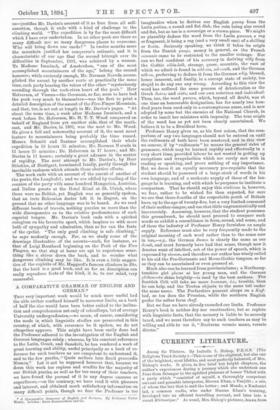A COMPARATIVE GRAMMAR OF ENGLISH AND GERMAN
Tins very important work would be much more useful had the able author confined himself to narrower limits, as a book of half the size would have been better suited to the inclina- tion and comprehension not only of schoolboys, but of average University undergraduates,—we mean, of course, considering the mode in which linguistic studies are prosecuted in this country, of which, with reverence be it spoken, we do not altogether approve. This might have been easily done had the Professor adhered to the investigation of the English and German languages solely ; whereas, by his constant references to the Latin, Greek, and Sanskrit, he has rendered a work of great learning and ability, useful principally as a book of re- ference for such teachers as are competent to understand it, and to the few youths, " Queis meliore luto finxit prieeordia Numen." Let it not be supposed however that, because we deem this work too copious and erudite for the majority of our British youths, as well as for too many of their teachers, we have found the perusal of it in any degree onerous or superfluous,—on the contrary, we have read it with pleasure and interest, and obtained much satisfactory information on many difficult points, though we fear the Professor is too 4* A Comparative Grammar of English and German. IIy Professor Victor tionry. Loudon : Swan Sonnenschein and Co.
imaginative when he derives our English penny from the Latin patina, a round and flat dish, the coin being also round and flat, but so too is a sovereign or a crown-piece. We might as plausibly deduce the word from the Latin pannus, a rag or fragment, it being a rag (and a very small one) of a shilling or florin. Seriously speaking, we think it takes its origin from the Danish pelage, money in general, as the French monnaie came to be restricted to the smaller coinage. Nor
can we feel confident of his accuracy in deriving silly from the Gothic silda-leilc, strange, queer, eccentric, the root of which we admit is found in seld-em, sel.couth, and the German selt-en, preferring to deduce it from the German selig, blessed, hence innocent, and finally, in a corrupt state of society, too stupid to do any one any wrong. According to this view the word has suffered the same process of deterioration as the Greek ilium; and Einikg and our own notorious and individual. Thus, too, the word parson, which, beyond all doubt, was at one time an honourable designation, has for nearly two hun- dred years been used only in a contemptuous sense, and is now adopted by none but the enemies of the National Church, in order to insult her ministers with impunity. The true origin of the word has as yet not been clearly ascertained. We believe it to be a Druidical term.
Professor Henry gives us, as his first axiom, that the com- parison of any two languages should not be entered on until the rudiments of both have been mastered, and in this view we concur, if by " rudiments " he means the general rules of grammar, which may be learned rapidly and effectually in a very short time, provided labour be not wasted in getting up exceptions and irregularities which are rarely met with in reading or speaking, and prove nothing of any importance. But we deem it an equally necessary pre-requisite that the student should be possessed of a large stock of words in his own language, and of a moderate supply of those of the lan- guage he is learning, and with which he purposes to institute a comparison. That he should enjoy this viaticum, is, however, we fear, rather to be wished for than expected, for sure we are that three-fourths of the respectable youth of Britain have, up to the age of twenty-five, but a very limited command of their mother-tongue, and use that little ungrammatically and inaccurately. Assuming, however, that the student possesses this groundwork, he should next proceed to compare such words as exhibit a resemblance in form, sound, and sense, and of these the industry of Professor Henry furnishes an ample supply. Reference must also be very frequently made to the original meaning of each word rather than to the sense now in use,—e.g., the German dumm, is clearly the same as our dumb, and must formerly have had that sense, though now it denotes want of intellect, not of the power of speech, which is expressed by stumm, and therefore our author has wisely called to his aid the Pre-Germanic and Mo3so-Gothie tongues, so far as they can be ascertained or even guessed at.
Much also can be learned from provincialisms ; a Northamp- tonshire girl gleens at her young man, and the German gliihen—to shine brightly—is used by the best authors. The Scottish Celt will take no more hummer, i.e., trouble, than he can help, and the Teuton objects to the same toil under the same name. The Forfarshire peasant sleeps on a Kay. bed, so too does the Prussian, while the southern English prefer the softer form chaff.
But we fear we have already exceeded our limits. Professor Henry's book is neither dry nor unattractive, but so replete with linguistic facts, that the memory is liable to be severely taxed, and we must therefore say to such teachers as may be willing and able to use it, " Nocturna versate mann, versate diurna."


















































 Previous page
Previous page